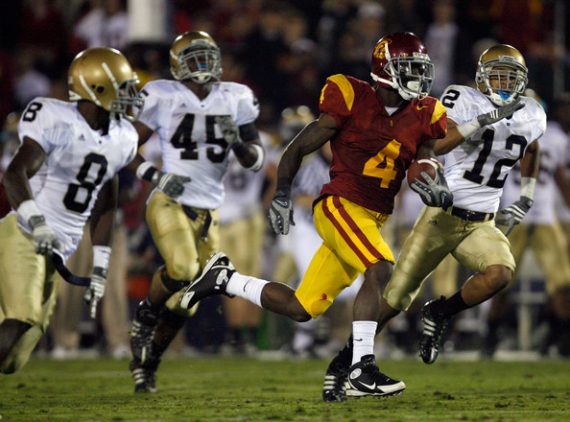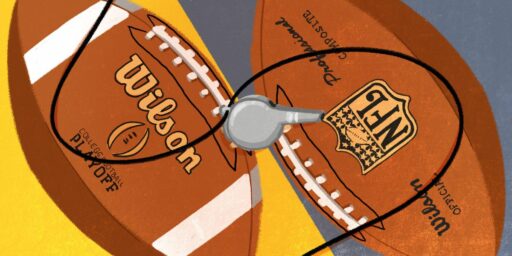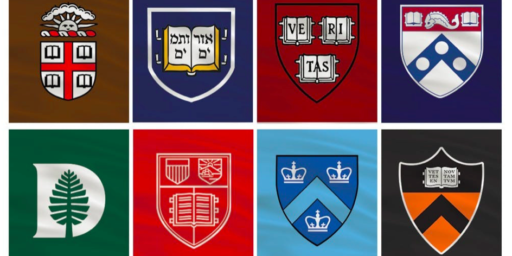Cleaning Up College Sports
Denver business ethics prof James O’Toole proposes a new intercollegiate athletic league for true student-athletes.
The old ideal of the serious student who also is a fine amateur athlete has become progressively corrupted in recent decades, particularly in the top-rated football and basketball programs at roughly 100 universities. As television revenues and professional sports salaries have soared, these universities have taken to offering scholarships to athletes who have little interest in obtaining an education and, instead, view their increasingly brief tenures in higher education as a form of unpaid minor-league preparation for their future professional sports careers. In effect, universities now suit-up unpaid mercenaries in their school colors, then cash in on their efforts.
True.
For a variety of financial, cultural and political reasons, all efforts to reform this corrupt system have failed and, realistically, are likely to fail in the future because the NCAA is dominated by large public colleges and universities whose alumni and governing legislatures have little appetite for change.
Also true.
But, O’Toole argues, some schools still care about academics but, for a variety of reasons, don’t want to leave big time athletics.
Stanford and Notre Dame could take the lead in establishing a national conference of first-rate academic institutions that offer athletic scholarships only to true student athletes, as defined, largely, by an iron-clad commitment to graduate with their classmates in four years. An invitation to join this conference could be extended to other private institutions with both high academic standards and proud athletic traditions – such as Northwestern, Duke, Boston College, Pittsburgh and Brigham Young (which could substitute a suitable variation on the four-year graduation policy to accommodate Mormon missions). The three United States service academies might also be asked to join.
The 12th member of this conference, I suggest, should be my alma mater, USC, where I was on the track team in the early 1960s and on the faculty for more than two decades. In the last dozen years, USC’s academic reputation has improved markedly, largely because of policies adopted under its soon-to-retire president, Steven Sample. Unfortunately, as a result of the current NCAA sanctions imposed on the university, Sample finds his excellent record sullied at the end of his term. But as the new president, Max Nikias, prepares to take office, he is well-positioned to turn the current crisis into an opportunity to create an athletic program worthy of the university’s emerging academic status.
So, having been hugely embarrassed by breaking the rules to compete in the Big Time, USC is now going to join a Choir Boy League?
Leaving that aside, I like the idea insofar as it goes. But why would any of these schools actually join? USC, Duke and Notre Dame, in particular, are raking in mad money under their current arrangements.
But, even if they could be persuaded, who would they compete against? Only schools within the conference? You can’t fill out a football season, much less a baseball or basketball schedule, with only 11 opponents.
Alas, I’m afraid the genie is out of the bottle. College football, in particular, was never a pristine business — the use of ringers and other win-at-any-costs schemes date back to the 1890s — and big television dollars have made it almost impossible to pretend that academic excellence is the primary consideration.
via Margaret Soltan







With all due respect, I don’t think these universities’ atheltic programs are raking in “mad money”. Athletic departments in major programs are all running about break even or having to depend on subsidies and donors to stay afloat. The money generated by the revenue programs (football and basketball) is used to support all the other athletic programs (coaches, equipment, travel, etc.) that do not generate enough revenue to cover their costs. The only real abuse, if you can call it that, is for the more exorbitant coaches salaries and perhaps a handful of ADs.
Without question, some kids are used by these programs, chewed up and spit out. On the other hand lots of kids are given opportunities they would never have had otherwise and some do take advantage of it to get an education rather than merely a better physique. My university (the University of Illinois) has high admission standards that regularly results in the denial of admission for some athletes that want to accept a scholarship to play football or basketball. Recently, these kids have wound up at Missouri, Mississippi, Marquette, New Mexico, Cincinnati, and some junior colleges after being denied admission at Illinois. I’d also note that Notre Dame has only recently tightened up its academic admission requirements after the abuses brought about by Lou Holtz. In fact, it has been noted in other places that Notre Dame hasn’t quite been the same since the administration there clamped down on the waivers granted to Lou Holtz’s recruits.
To claim the the University of Illinois or the other Big 10 schools don’t care about academics is wrong and insulting. This whole discussion is motivated by an unrealistic view of what is and what can be. Mr. O’Toole is just being a tool.
I’ve been telling my kids for years that if they want to play sports for a division 1 school, they better have a complete ride because I won’t pony up as much as a nickle. You might be able to graduate while working 60-80 hours per week with the sports program but you certainly aren’t going to get an education. My nephew wrestled for a Big 10 team. He entered as a Computer Engineering major and proceeded to transfer to a less demanding degree every year. By the time he graduated he he had wrist, nerve and knee damage and a degree he thought allowed him to teach PE and coach wrestling at the high school level. He was wrong about that. Since there is no professional wrestling (as opposed to Professional Wrestling TM), upon graduation he worked a day job his brother scraped up for him and at night tried his hand at Ultimate Fighting. That finally seemed to knock some sense into him and he got his Masters in Computer Science at night school and now is doing quite well as he is exceptionally bright (academically, not life choice). But how many of the thousands and thousands of student athletes could get that Masters degree if they had to rely on the “education” they got in between their sports for admissions? So that’s why, IMHO, a good parent discourages their kid from getting involved with Division 1 sports in much the same way they would discourage them from spending five years getting 75% completion on an Art History degree and then dropping out.
University football and basketball programs are completely corrupt and very little will ever change that – because as the article points out Universities, their students and alumni all identify with winning football and basketball teams. How many universities are well known for other sports programs, like track & field, swimming, gymnastics, etc??? Answer: only the athletes who participate in those slightly obscure sports and their parents.
Even more interesting is the terrible “resorting to serious crime” track-record of football and basketball players who fail to graduate or fail to get picked up by the professional leagues – it is a national disgrace. I would not have used the phrase mercenary as much as sports athlete slaves. The schools use them up and throw them away without any real academic preparation for a meaningful life after college sports. Shame on the NCAA!
Also….
Rick Maese of the Orlando Sentinel has an intriguing piece on how Division I college football players who commit serious crimes are often afforded “second chances” that members of the general student population do not enjoy. (Maese,”Justice for All?,” Orlando Sentinel, 7/31/2005). In doing so, Maese details the frequency at which top college football programs feature ex-cons, including those who have been convicted of violent crimes like involuntary manslaughter, felony assault, and armed robbery. He then compares college football players who commit felonies and are not expelled with non-athlete students at the same schools who commit misdemeanors but are expelled. This pattern of inconsistent treatment is not surprising, notes Maese, since athletes are granted “special leniency” during the college admissions process, and that “special leniency” remains with them so long as they are premiere athletes.
So why do ex-con football players receive 1) free tuition and 2) reusable “get out of jail free” cards when their classmates do not? The answer, as we all know, is obvious: the brilliant pre-med students, the brainy pre-engineering students, and the talented political science students do not generate money and national publicity for their schools, while their sometimes-criminal peers on the football team do. It’s that not-so-wonderful “market effect” that affords college football players a different set of rules, and the opportunity to ignore the law over-and-over again without repercussion.
Maese’s findings are even more interesting when we consider the extent to which ex-cons on the football team might pollute their otherwise law-abiding teammates. Given this environment of “special leniency,” and thus a lack of behavioral deterrence, it stands to reason that an 18-year old freshman on the football team might be more prone engage in criminal activity when he sees the “veteran” 20- and 21-year olds on the team doing so and not suffering any material consequence. This is the negative “big brother” effect in action.
Maese’s article is a useful counterpart to my recent study on NBA player arrests and age/education. After studying NBA player arrests, I found that 1) college education does not appear to diminish the probability of an NBA player getting in trouble with the law; and 2) NBA players appear more likely to get in trouble with the law towards the middle and end of their careers than at the start.
The romanticized myth of college sports enhancing maturity and law-abidingness continues to crumble before our eyes.
I don’t see too many schools jumping on this idea.
I do like the idea of offering scholarships to only those people who intend to graduate vs leave in two years. But big schools will still want to win, so they are going to take the players who will give them wins for a couple of years then wave goodbye as they head off to the pros.
But not all sports are like this and not all student athletes fail to finish school with challenging degrees that take them into good careers.
There’s already several leagues for true “student-athletes”; in addition to D-3 (where athletic scholarships are prohibited across the board) several D-1 and D-2 conferences forbid athletic scholarships, most prominently the Ivy League (I-AA/FCS in football). And the scholarship levels below I-A at many institutions are such that most student-athletes are either walk-ons or on partial scholarships only.
What Chris Lawrence said. He’s essentially describing the Ivy League but with (mostly) less rigorous academics.
The schools use them up and throw them away without any real academic preparation for a meaningful life after college sports. Shame on the NCAA!
If I could have four years playing college football (were I so talented, of course) where I did not have to work (except for practice and games) and could accumulate the lifetime worth of memories and the glory of having played football at the college level, I would give it some serious thought. A good portion of the kids that play at the college level and do not graduate do not have nearly alternatives nearly as desirable as I do (did). Take away college football and I don’t know that you’re doing a lot of these kids any favors.
I know this is an abstract concept for some: In a society that rewards bad behavior and punishes good choices and productivity, we can expect all to suffer equally – essentially a absolute decline in American life. Why can’t we ask these young folks to strive to become good citizens? Why can’t we reward them when they do and hold them accountable when they don’t? Those ideas used to be part of high school and college life before the PC police and apologist for the sociopathic class change things for the worse. After all, equality forced by government policy and the sport-economic-reality, but not earned, is change we shouldn’t believe in… Why is an expectation of citizenship and good behavior such an abstract? It comes down to two things: money and greed.